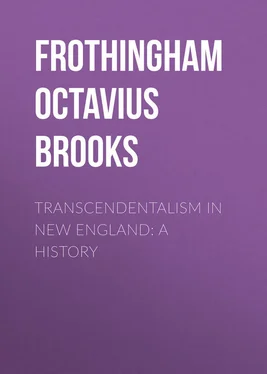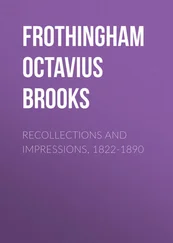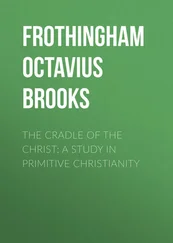Octavius Frothingham - Transcendentalism in New England - A History
Здесь есть возможность читать онлайн «Octavius Frothingham - Transcendentalism in New England - A History» — ознакомительный отрывок электронной книги совершенно бесплатно, а после прочтения отрывка купить полную версию. В некоторых случаях можно слушать аудио, скачать через торрент в формате fb2 и присутствует краткое содержание. Жанр: foreign_antique, foreign_prose, на английском языке. Описание произведения, (предисловие) а так же отзывы посетителей доступны на портале библиотеки ЛибКат.
- Название:Transcendentalism in New England: A History
- Автор:
- Жанр:
- Год:неизвестен
- ISBN:нет данных
- Рейтинг книги:4 / 5. Голосов: 1
-
Избранное:Добавить в избранное
- Отзывы:
-
Ваша оценка:
- 80
- 1
- 2
- 3
- 4
- 5
Transcendentalism in New England: A History: краткое содержание, описание и аннотация
Предлагаем к чтению аннотацию, описание, краткое содержание или предисловие (зависит от того, что написал сам автор книги «Transcendentalism in New England: A History»). Если вы не нашли необходимую информацию о книге — напишите в комментариях, мы постараемся отыскать её.
Transcendentalism in New England: A History — читать онлайн ознакомительный отрывок
Ниже представлен текст книги, разбитый по страницам. Система сохранения места последней прочитанной страницы, позволяет с удобством читать онлайн бесплатно книгу «Transcendentalism in New England: A History», без необходимости каждый раз заново искать на чём Вы остановились. Поставьте закладку, и сможете в любой момент перейти на страницу, на которой закончили чтение.
Интервал:
Закладка:
IV.
TRANSCENDENTALISM IN FRANCE
From the time of Malebranche, who died in 1715, to Maine de Biran, Royer-Collard, Ampère and Cousin, a period of about a century, philosophy in France had not borne an honorable name. The French mind was active; philosophy was a profession; the philosophical world was larger than in Germany, where it was limited to the Universities. But France took no lead in speculation, it waited to receive impulse from other lands; and even then, instead of taking up the impulse and carrying it on with original and sympathetic force, it was content to exhibit and reproduce it. The office of expositor, made easy by the perspicacity of its intellect and the flexibility of its language, was accepted and discharged with a cleverness that was recognized by all Europe. Its histories of philosophy, translations, expositions, reproductions, were admirable for neatness and clearness. The most obscure systems became intelligible in that limpid and lucid speech, which reported with faultless dexterity the agile movements of the Gallic mind, and made popular the most abstruse doctrines of metaphysics. German philosophy in its original dress was outlandish, even to practised students in German. The readers of French were many in England and the United States, and the readers of French, without severe labor on their part, were put in possession of the essential ideas of the deep thinkers of the race. The best accounts of human speculation are in French. Barthélemy Saint Hilaire interprets Aristotle, and throws important light on Indian Philosophy; Bouillet translates Plotinus; Emil Saisset translates Spinoza; Tissot and Jules Barni perform the same service for Kant; Jules Simon and Etienne Vacherot undertake to make intelligible the School of Alexandria; Paul Janet explains the dialectics of Plato; Adolphe Franck deals with the Jewish Kabbala; Charles de Rémusat with Anselm, Abelard and Bacon; MM. Hauréau and Rousselot with the philosophy of the middle age; M. Chauvet with the theories of the human understanding in antiquity. Cousin published unedited works of Proclus, analyzed the commentaries of Olympiodorus on the Platonic dialogues, made a complete translation of Plato, admirable for clearness and strength, and proposed to present, not of course with his own hand, but by the hands of friendly fellow-workers, and under his own direction, examples of whatever was best in every philosophical system. The philosophical work of France is ably summed up in the report on "Philosophy in France in the nineteenth century," presented by Felix Ravaisson, member of the Institute, and published in 1868, under the auspices of the Ministry of Public Instruction.
The ideas of Locke were brought from London to Paris by Voltaire, who became acquainted with them during a residence in England, and found them effective in his warfare against the ecclesiastical institutions of his country. Through his brilliant interpretations and keen applications, they gained currency, became fashionable among the wits, were domesticated with people of culture and elegance, and worked their way into the religion and politics of the time. It is needless to say that in his hands full justice was done to their external and material aspects.
The system found a more exact and methodical expounder in Condillac, who reduced it to greater simplicity by eliminating from it what in the original marred its unity, namely reflection, the bent of the mind back on itself, whereby it took cognizance of impressions made by the outer world. Taking what remained of the system, the notion that all knowledge came primarily through the senses, and drawing the conclusion that the mind itself was a product of sensation, Condillac fashioned a doctrine which had the merit, such as it was, of utter intelligibleness to the least instructed mind; a system of materialism naked and unadorned. If he himself forbore to push his principle to its extreme results, declining to assert that we were absolutely nothing else than products of sensation, and surmising that beneath the layers of intelligence and reason there might lurk a principle that sensation could not account for, something stable in the midst of the ceaseless instability, something absolute below everything relative, which might be called action or will, the popular interpretation of his philosophy took no account of such subtleties. In vain did his disciple Destutt de Tracy declare that "the principle of movement is the will, and that the will is the person, the man himself." The fascination of simplicity proved more than a match for nicety of distinction, and both were ranked among materialists.
Cabanis was at no pains to conceal the most repulsive features of the system. In his work, "The Relations of the Physical and the Moral in Man," he maintained bluntly the theory that there was no spiritual being apart from the body; that mind had no substance, no separate existence of its own, but was in all its parts and qualities a product of the nervous system; that sensibility of every kind, sentimental, intelligent, moral, spiritual, including the whole domain of conscious and unconscious vitality, was a nervous manifestation; that man was capable of sensation because he had nerves; that he was what he was because of the wondrous character of the mechanism of sensation; that, in a word, the perfection of organization was the perfection of humanity. It was Cabanis who said "the brain secretes thought as the liver secretes bile." Cabanis modified his philosophy before his death, but without effect to break the force of his cardinal positions. The results of such teaching appeared in a morality of selfishness, tending to self-indulgence – a morality destitute of nobleness and sweetness, summing up its lessons in the maxims that good is good to eat; that the pleasurable thing is right, the painful thing wrong; that success is the measure of rectitude; that the aim of life is the attainment of happiness, and that happiness means physical enjoyment; that virtue and vice are names for prudence and for folly, – Virtue being conformity with the ways of the world, Vice being non-conformity with the ways of the world; no ideal standard being recognized for the one, no law of rectitude being confessed for the other. Conscience was regarded as an artificial habit created by custom or acquiesced in from tradition; the "categorical imperative" was pronounced the dogmatism of the fanatic.
From such principles atheism naturally proceeded. Atheism not of opinion merely, but of sentiment and feeling; for at that time "the potencies" of matter impressed no such awe upon the mind as they have done since; the "mystery of matter" was unfelt; physiology was an unexplored region; the materialist simply denied spirit, putting a blank where believers in religion had been used to find a soul; and had no alternative but to run sensationalism into sensualism, and to give the senses the flavor of the ground. With us the sensational philosophy has become refined into a philosophy of experience, and the materialist finds himself in a region where to distinguish between matter and spirit is difficult, to say the least. But a hundred years ago matter was clod, and the passion it engendered smelt of the charnel-house. The morbid insanities of the revolution, the orgies in which blood and wine ran together, the savage glee, the delirium that ensued when the uncertainty of life acting on the impulse to enjoy life while it lasted, made men ferocious in clutching at immediate pleasure, attest the consequences that ensued from such frank adoption of the sensational philosophy as was practised among the French. Locke was a man of piety, which even his warmest apologists will hardly claim for Voltaire. The English mind, grave and thoughtful, trained by religious institutions in religious beliefs, was less inclined than the French to drive speculative theories to extreme conclusions. The philosophy of sensationalism culminated, not in the French Revolution, as has been vulgarly asserted, but in the unbelief and sensual extravagance that marked one phase of it.
Читать дальшеИнтервал:
Закладка:
Похожие книги на «Transcendentalism in New England: A History»
Представляем Вашему вниманию похожие книги на «Transcendentalism in New England: A History» списком для выбора. Мы отобрали схожую по названию и смыслу литературу в надежде предоставить читателям больше вариантов отыскать новые, интересные, ещё непрочитанные произведения.
Обсуждение, отзывы о книге «Transcendentalism in New England: A History» и просто собственные мнения читателей. Оставьте ваши комментарии, напишите, что Вы думаете о произведении, его смысле или главных героях. Укажите что конкретно понравилось, а что нет, и почему Вы так считаете.












